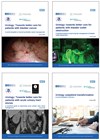Features
An overview of non-surgical treatment options for Peyronie’s disease
Peyronie’s disease (PD) is a therapeutic challenge despite the availability of several non-surgical and surgical options. Very few of these options are supported by good quality evidence according to the current American and European guidelines [1-3]. The period of plaque...
An account of training and practice of urology in Nigeria
Nigeria is the most populous nation on the continent of Africa. Within the country, there are 33,303 general hospitals and 59 tertiary hospitals to serve a population of approximately 210 million people [1]. Specialty-based practice of urology is domiciled in...
Recent developments in bladder cancer – NMIBC
Every year, roughly 10,300 individuals are diagnosed with bladder cancer in the UK, making it the 11th most common cancer in the UK, and the eighth most common cancer in men [1]. Of those diagnosed with the disease, 75-85% will...
Still Getting It Right First Time (GIRFT) in urology: meeting the challenges presented by COVID-19
Back in 2019, Simon Harrison – the then sole national lead for the urology workstream in the Getting It Right First Time (GIRFT) programme – wrote an article for Urology News on the GIRFT national report and how its recommendations...
BAUS Section of Trainees (BSoT)
7-9 March 2022 • Edinburgh, UK • Nicholas Boxall, Chair (Elect), BSoT, ST6 Urology, Health Education East of England; and Neil Harvey, BSoT Chair, ST7 Urological Surgery, North West Deanery. The BSoT conference kicked off on Monday 7 March with...
New senior appointments at The Urology Foundation
New Chief Executive appointed The Urology Foundation (TUF) has appointed Rebecca Porta as Chief Executive. An established and experienced charity Chief Executive, Rebecca brings a wealth of experience having held senior roles within some of the UK’s leading health and...
Medical statistics for urologists: part 2 – probability and hypothesis testing
Following on from Part 1 of this series (Part 3 available here), this article aims to build on other analytical techniques commonly used within medical research, focusing on simple examples. Probability and testing Before exploring hypothesis testing, it is vital...
Priapism in sickle cell disease
What is sickle cell disease? Sickle cell disease (SCD) is one of the most common single-gene disorders in the UK affecting approximately one in every 2000 live births. Approximately 20-25 million people worldwide have SCD. It predominately affects those of...
Moving hospitals as a consultant urological surgeon: what are the challenges?
Despite over 100 unfilled consultant urological surgeon posts in the UK, the reasons why an established surgeon should wish to move hospitals can still be viewed with suspicion. Why is this the case, when in many other careers, both within...
25 Years of Prostate Cancer UK
As leading men’s health charity, Prostate Cancer UK, celebrates its 25th anniversary, top researchers reflect on the huge progress in testing, treatment and support for men over the past 25 years. 25 years of beating prostate cancer together Matthew Hobbs,...
Frequency-volume chart apps for nocturia: keeping urologists up at night
Background Nocturia is a bothersome symptom and the leading cause of disturbed sleep in adults. It is extremely common, with 55% of men and 60% of women aged 50 waking at least once in the night, with a further 20%...
Men with a susceptibility to prostate cancer: implications of ethnicity in PCa risk-prediction and diagnosis
The diagnostic and therapeutic landscapes of prostate cancer (PCa) have advanced at great pace in the past decade. However, disparities in access to care, clinical outcomes and representation in therapeutic, interventional and genomic studies continue to exist between Afro-Caribbean (AC)...














